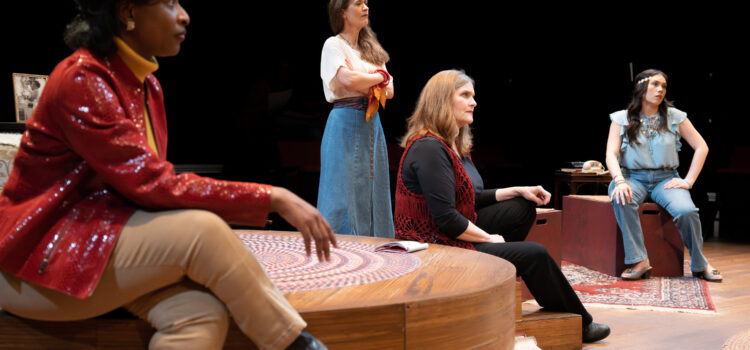By Lynn Venhaus
Relevant and empowering, New Jewish Theatre’s “Gloria: A Life” celebrates one of the most inspiring women in history with a knockout performance by Jenni Ryan as feminist icon Gloria Steinem.
Ryan wasn’t initially cast as Steinem, but was announced as the replacement on May 27, a mere five days before opening night. Under intense pressure, not to mention a time crunch, Ryan admirably captures the essence of the leading lady, with gumption and authenticity.
Like others who have been called in at the last minute on productions, for the-show-must-go-on on opening night June 1, she did have a script with her, and nonchalantly glanced at it a few times, but without any awkward interruptions. She affected Steinem’s calmer demeanor while other females are venting on inequality.
Ryan was last seen at the J as the mom in “Broadway Bound” in January. This current turn is a real-life triumph when the show is highlighting women’s accomplishments. After all, Steinem refers to herself as a “Hope-aholic.”
Hope and drive permeate this work. And Ryan gets it – why Gloria matters, why this story is important, and why it is crucial that social activism continue in this current political climate.
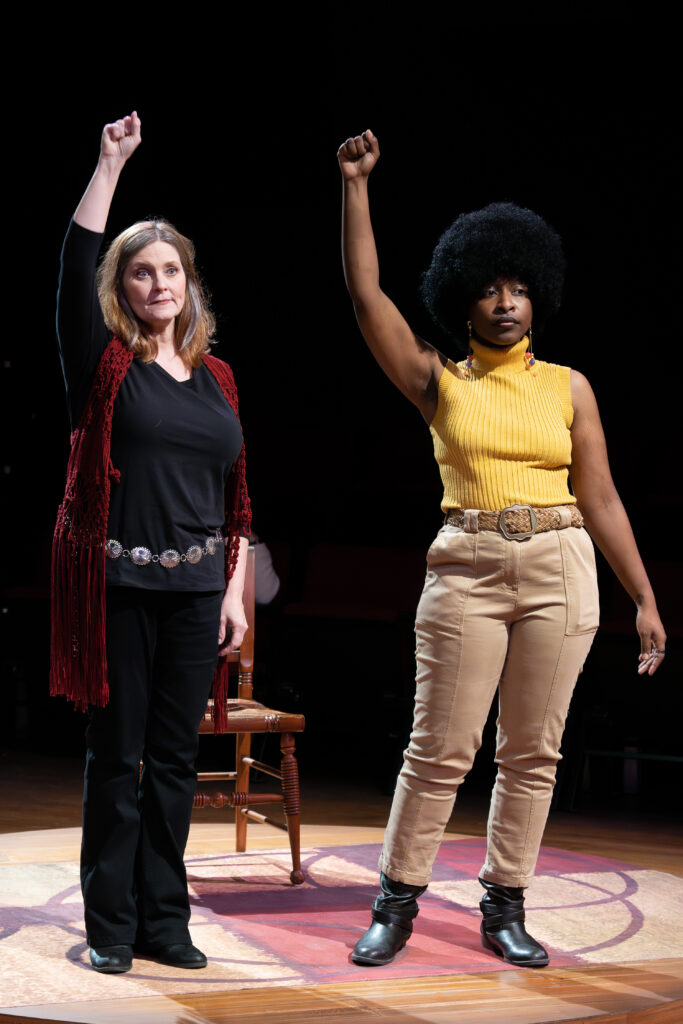
But it’s not a one-woman show. Emily Mann’s play spotlights other remarkable activists who were catalysts for change in the workplace, the home, and politics in the late 20th century.
Mann, a veteran playwright and artistic director, enlisted Steinem’s participation and guidance for this play, which premiered in 2018.
Now 89 years old, Steinem’s legacy is a remarkable one, and this interpretation details how she used her voice to champion others, putting into practice her philosophy that conversations can prompt changes.
For those who weren’t alive during the rise of the women’s liberation movement in the 1960s and 1970s, this gives that time perspective and is a valuable history lesson. But the 90-minute play (without intermission) is not merely a look back at the discrimination and harassment women faced and how they found their voices in unity.
Rather, it is an urgent call to action for today’s pressing issues. Because struggles are ongoing – race relations, reproductive rights, gender equality, gun violence, patriarchy, #MeToo, other freedoms threatened and democracy in peril. (And that’s where the second act comes into play.)
During the first act of Gloria’s journey, a passionate ensemble embodies a revolutionary spirit, with six actresses playing various pioneers of an earlier era and key people in Gloria’s life.
Actress Sarah Gene Dowling is both gutsy Congresswoman Bella Abzug and Gloria’s broken mother Ruth; Kayla Ailee Bush is fiery Ms. Magazine co-founder Dorothy Pitman Hughes; and Lizi Watt is fierce Wilma Mankiller, first female chief of Cherokee Nation, among the prominent figures; and Chrissie Watkins, Summer Baer, and Carmen Cecilia Retzer take on multiple roles, wearing many hats (and scarves).
Civil rights attorney Florynce Kennedy is depicted, as are women wanting to make a difference. Nevertheless, there are some famous not-so-nice guys, people who aren’t fans, and other negative folks among the positivity.
As directed by Sharon Hunter in the J. Wool’s Studio Theater space configured in the round, the women swiftly move in and out, expressing themselves in discussion, fiery tirades, protests, sisterhood bonding, period music and dance. They reflect the conscience-raising efforts of those past decades.
Significant life touchstones mentioned include Steinem’s reporting days (of course the undercover Playboy Bunny magazine piece); co-founding the National Women’s Political Caucus in 1971 with Abzug, Betty Friedan, Shirley Chisholm, and others; co-founding the monthly Ms. Magazine in 1972; and the 1977 National Women’s Conference.
Gloria’s story portion concludes with the Women’s March in January 2017 in Washington D.C., where Steinem spoke to thousands of women wearing pink pussy hats.
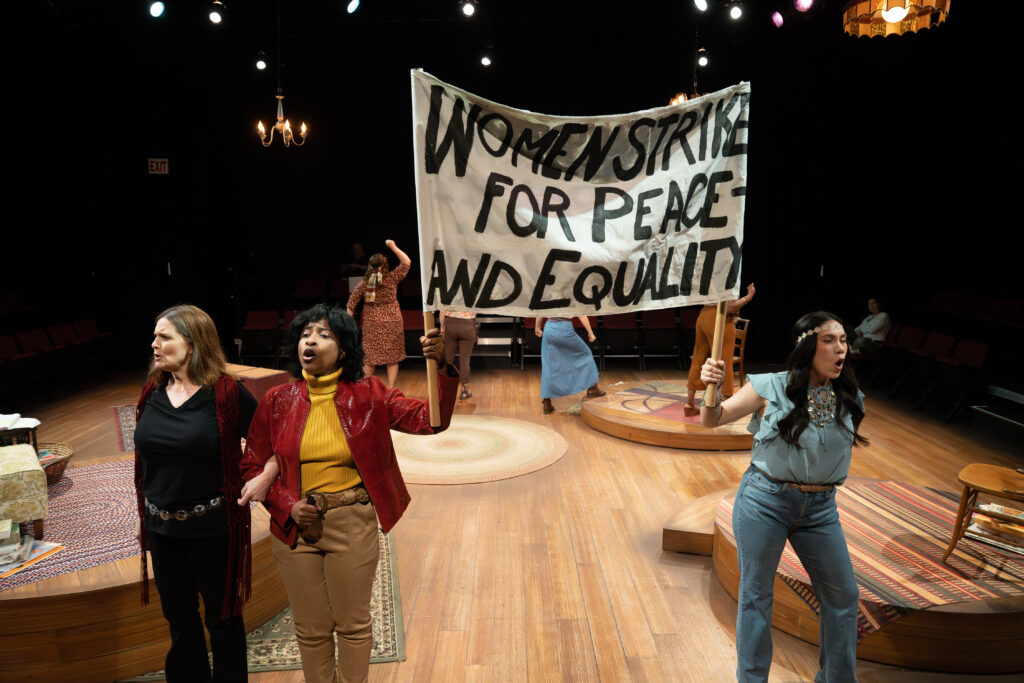
A lively Dowling excels as “Battling Bella” – who was elected to the House of Representatives for New York City’s 19th district in 1970, and was a driving force in liberal political organizations, supporting the Equal Rights Amendment, a women’s credit-rights bill, abortion rights, and child-care legislation. (In 1974, women could finally get a loan without their father or husband co-signing it, thanks in part to Bella).
It’s also important to note that the cast and crew are all women. Scenic designer Fallon Podrazik kept the set simple for movement and interaction, costume designer Michele Friedman Siler assembled retro fashions representative of the times, while sound designer Amanda Werre created a mélange of important sound bites and familiar tunes, and there is distinct illumination from lighting designer Denisse Chavez.
Props master Katie Orr’s work was particularly demanding, replicating magazine articles and finding Ms. Magazine issues, not to mention making protest signs.
And there is a unique second act, a 20-minute interactive “talking circle,” that seeks audience participation in hopes of harnessing the energy of this production. Playwright Mann thought it was important to engage people and that these conversations could propel folks into action, pointing to Steinem’s mantra “the healing is in the telling.”
The ultimate goal is for people to learn from each other, and as Gloria has said: “This is the way we discover we’re not crazy and we’re not alone.”

At several performances, a local Guest Responder is launching the talking circle by sharing their own story of breaking barriers or simply responding to the play. For a complete list, visit: jccstl.com/njt-gloria-a-life.
The night I was there, State Senator Tracy McCreery led the conversation. One of the audience members pointed out that black women were at the forefront of the feminism movement, and that led to more reflections.
While it may seem that the needle hasn’t been moved that much in the past 10 years, I know that I stand on the shoulders of giants, and I am appreciative of the women who fought hard for the rights we now enjoy. After this viewing, I am optimistic, citing the words of “Hamilton”: “This is not a moment, it’s a movement.”
“Gloria: A Life” is certainly galvanizing, and the cast is enthusiastic about the stories they are sharing. It can fire up younger generations and spark renewed excitement by re-activating those Baby Boomers who recall the victories of the past. And Steinem is still fighting for human rights.
And this intimate look is another opportunity for those to marvel at how far we have come– although the work is unfinished. There are more trails to blaze and fires to put out. The play has something to say and the cast underlines it with vigor.
New Jewish Theatre presents “Gloria: A Life” from June 1 – 18, on Thursdays at 7:30 p.m., Saturdays at 4 and 8 p.m., and Sundays at 2 p.m. at the SFC Performing Arts Center, 2 Millstone Campus Drive. For more information: jccstl.com/arts-ideas/new-jewish-theatre. For tickets, call 314-442-3283 or go online at newjewishtheatre.org.
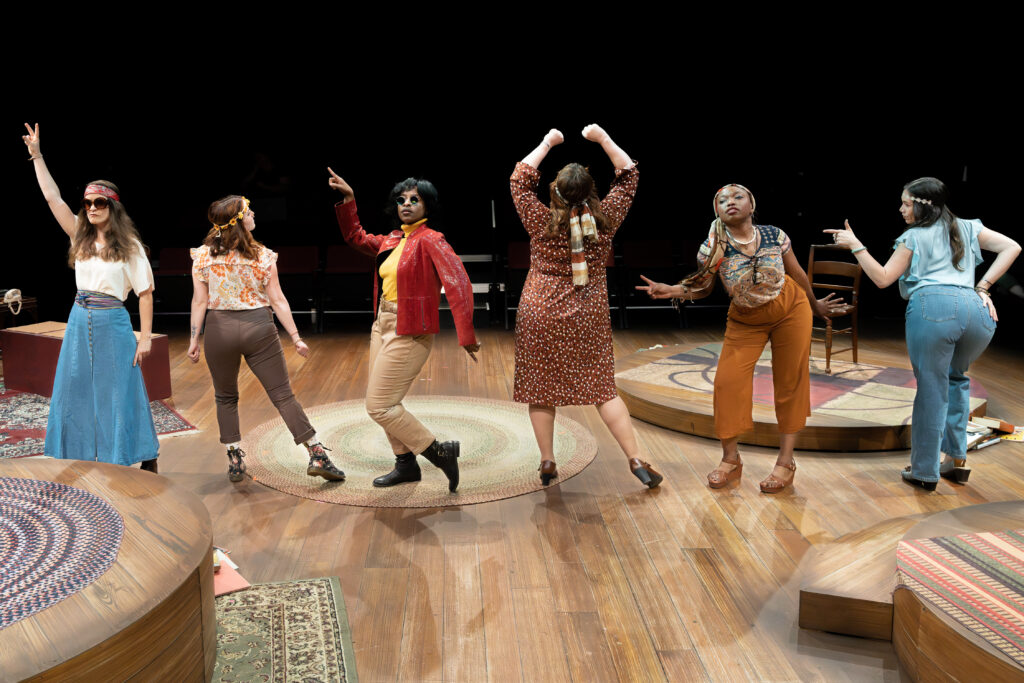
Addendum: Some follow-up streaming programming:
- “9to5: The Story of a Movement” is a 2021 documentary directed by Steven Bognar and Julia Reichert,” and currently streaming on Netflix. (It won the Joe Williams Documentary Award given by the St. Louis Film Critics Association. I was on that jury).
- CNN miniseries “The Seventies” in 2015 – seventh episode is “Battle of the Sexes.” (Max)
- In a 2020 Amazon Prime original narrative film, “The Glorias,” Julie Taymor directed four different actresses to play Steinem at different stages of her life — Julianne Moore and Alicia Vikander as adults and Ryan Kiera Armstrong and Lulu Wilson as youngsters.
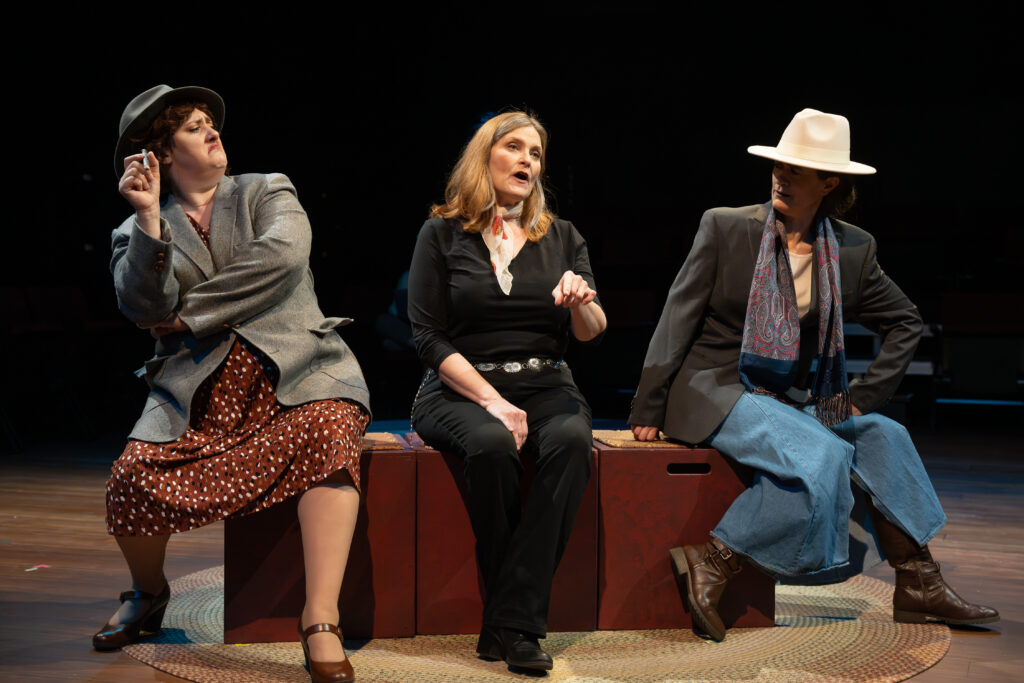

Lynn (Zipfel) Venhaus has had a continuous byline in St. Louis metro region publications since 1978. She writes features and news for Belleville News-Democrat and contributes to St. Louis magazine and other publications.
She is a Rotten Tomatoes-approved film critic, currently reviews films for Webster-Kirkwood Times and KTRS Radio, covers entertainment for PopLifeSTL.com and co-hosts podcast PopLifeSTL.com…Presents.
She is a member of Critics Choice Association, where she serves on the women’s and marketing committees; Alliance of Women Film Journalists; and on the board of the St. Louis Film Critics Association. She is a founding and board member of the St. Louis Theater Circle.
She is retired from teaching journalism/media as an adjunct college instructor.

